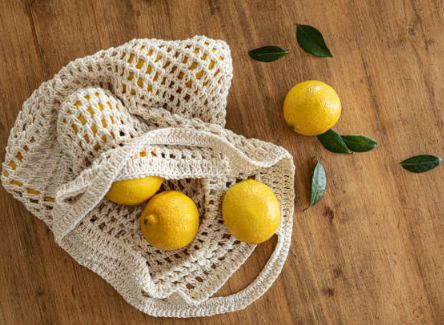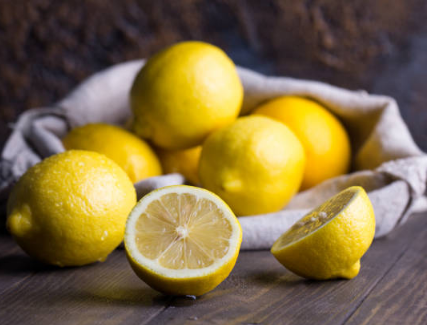Lemon (Citrus limon) is a citrus fruit known for its sour, bitter taste, and bright yellow color. They are rich in vitamin C and antioxidants that support all aspects of health. For example, lemon water is popular for helping reduce the risk of kidney stones, promoting vitamin C intake, and supporting healthy digestion.

Lemons, like other citrus fruits, belong to the Rutaceae family. Read on to learn about the benefits and risks of lemons and tips for incorporating them into your meals and snacks.
1. Helps Prevent Kidney Stones
Kidney stones are also known as kidney stones or kidney stones. They are hard deposits made up of minerals that accumulate in the urethra and form in the kidneys. Kidney stones affect about 10% of people. Increasing the weak acid content of citrate in the urine and making the urine alkaline can help prevent kidney stones.
Lemons contain a type of citrate called citric acid, which helps increase the level of citrate in the urine. Citric acid binds to urinary calcium and helps prevent urine from becoming oversaturated. It also binds to clumps of hard minerals called calcium oxalate crystals to prevent them from growing and becoming painful kidney stones.

According to the National Kidney Foundation, drinking four ounces of concentrated lemon juice mixed with water a day may help prevent kidney stones. However, if your urine pH is too acidic, an alkali metal citrate (e.g., potassium citrate) may be better. When in doubt, talk to your doctor about your risk of kidney stones and the best prevention options for you.
2. Supports Heart Health
Lemons are rich in vitamin C and other antioxidants that support heart health. Consuming enough vitamin C can protect your cells from damage caused by free radicals, which are highly unstable particles that can cause damage to cells if not neutralized. This can help prevent atherosclerosis (the buildup of plaque in the arteries), a condition that increases the risk of heart attack and stroke.
Phenolic compounds are antioxidants found in lemons that support healthy blood pressure, endothelial function, and low-density lipoprotein (LDL) cholesterol levels. Endothelial function refers to how smoothly blood moves throughout the body. High blood pressure, high LDL cholesterol levels, and decreased endothelial function increase the risk of heart disease.

Eating lemons also increases your total intake of fruits and vegetables. A large 2017 study found that higher fruit and vegetable intake was associated with a lower risk of cardiovascular disease, cancer, and all-cause mortality (the risk of death from any cause).
3. Enhance Iron Absorption
One lemon contains more than 30% of the daily intake (DV) of vitamin C. Vitamin C is important for iron absorption, as well as for reducing the risk of heart disease. It can help you better absorb non-heme iron, which is found in plants and iron-fortified foods like bread and cereals.
Pairing a food source of iron with vitamin C can help you absorb iron more efficiently. This can be especially beneficial if you’re a vegetarian or vegetarian and consume mostly non-heme iron. It prevents iron deficiency anemia, a condition caused by the body not having enough iron to produce hemoglobin. Hemoglobin is a protein in red blood cells that carries oxygen throughout the body.
4. Prevent Cell Damage

The antioxidants in lemons protect against cell damage associated with health conditions such as cardiovascular disease, chronic kidney disease, cancer, and chronic obstructive pulmonary disease (COPD). Chronic obstructive pulmonary disease (COPD) is a group of chronic, progressive lung diseases that restrict airflow to the lungs and cause breathing difficulties.
Numerous studies have shown that citrus fruits are rich in antioxidants. Antioxidants are found in juices and pulp, but recent studies have shown that citrus peels contain higher levels of health-promoting antioxidants.
Lemon Nutrition
A lemon without skin has the following nutrients:
- Calories:17
- Fat:0.2 grams (g)
- Sodium:1 milligram (mg)
- Carbs:5 grams
- Fiber:1.6 grams, or 6% of DV
- Protein:0.6 grams
- Vitamin C: 31 mg, or 34% of the daily value
Lemons also contain other micronutrients such as potassium, vitamin B6, and thiamine. Micronutrients are small amounts of vitamins and minerals that the body needs.
Lemons are quite low in calories. Their main nutritional value comes from vitamin C, but they are also a good source of phenolic compounds and carotenoids. These antioxidants protect against oxidative stress and cell damage associated with chronic diseases.
Lemon Risk
Lemons are generally safe to consume in foods and beverages. However, experts are uncertain about its safety in medical doses, such as lemon concentrate supplements, because we do not have enough reliable information.

Inhaling lemons for aromatherapy, such as diffusing lemon essential oil, seems generally safe. However, phototoxicity is a potential risk. Phototoxicity is the skin’s harmful reaction to light after exposure to chemicals.
Some people may be sensitive to citrus fruits. Possible reactions range from mild symptoms, such as itching around the mouth, to allergic reactions, a serious and potentially life-threatening condition. If you think you may have an allergy to citrus fruits, contact your healthcare provider. They can help you get tested for allergies and get treatment if necessary.
Tooth erosion is another possible risk of lemons. The acid in lemons breaks down tooth enamel, so it’s best to rinse your mouth with water after eating lemons.
Finally, some people with acid reflux or gastroesophageal reflux disease (GERD) find that the acidity of citrus fruits can worsen their symptoms. Gastroesophageal reflux disease is a condition of the gastrointestinal tract that occurs when stomach acid flows repeatedly back into the esophagus (the tube that carries food from the mouth to the stomach).
Tips for Consuming Lemons
Adding some lemons throughout the day and week can help you increase your vitamin C intake and antioxidant consumption to support your health. Here are some tips for eating more lemons and maximizing their freshness:
- Store the lemons in the freshness area of the refrigerator to maximize freshness
- Freeze the lemons that you don’t intend to use in cubes or whole lemons to avoid waste
- Add lemon juice or lemon slices to water or tea
- Marinate meat, fish or tofu in lemon juice and garnish with lemon slices
- Make a simple salad of beans (e.g., chickpeas) with lemon sauce to enhance the absorption of non-heme iron
- Use lemon or lemon zest to add flavor to soups, cereals, or pastries